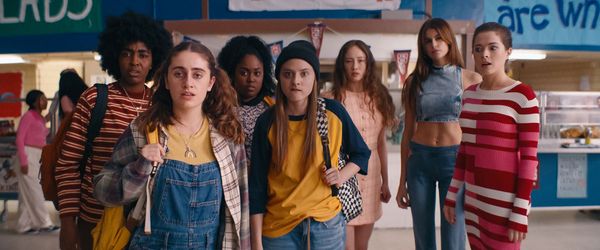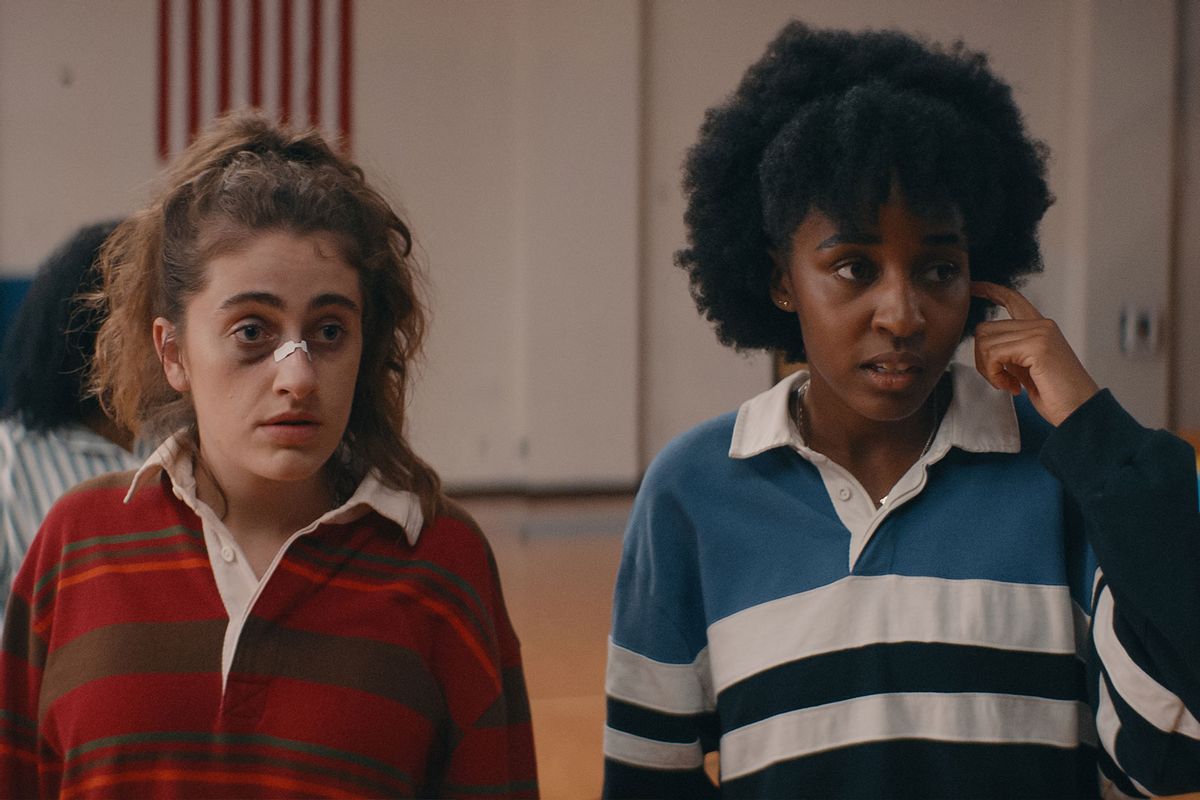"It was as though some mysterious all-knowing master had given each one a cloak of ugliness to wear, and they had each accepted it without question. The master had said, 'You are ugly people.' They had looked about themselves and saw nothing to contradict the statement; saw, in fact, support for it leaning at them from every billboard, every movie, every glance. 'Yes,' they had said. 'You are right.' And they took the ugliness in their hands, threw it as a mantle over them, and went about the world with it. Dealing with it each according to his way." – Toni Morrison, "The Bluest Eye"
"Bottoms" begins with best friends PJ (Rachel Sennott) and Josie (Ayo Edebiri) primping in front of a mirror with typical teenage self-involvement, prepping for a pre-senior year carnival where they hope to be noticed by the cheerleaders they're crushing on, Isabel (Havana Rose Liu) and Brittany (Kaia Gerber).
These two are typical awkward high schoolers, which is to say they're horny and style deficient. Unlike Molly Ringwald's Andie Walsh, the creative outsider heroine of "Pretty in Pink," they don't have a knack for putting quirky outfits together, leaving the frills to other girls. PJ tosses together a busted homage to Britney Spears that the object of her lust describes as making her look like a Dutch boy.
Josie, whose expectations are much lower, refuses to make even that much of a fuss. What's the use? Isabel is dating the school's football star Jeff (Nicholas Galitzine), who rules the highest rung of the social ladder while they're hanging out on the bottom.
Still, Josie says, just because they're ugly and untalented doesn't mean they don't deserve to get laid. They're also lesbians, but whatever. Nobody cares about that. It's the two strikes of being ugly and untalented that mark them as outcasts.
Such a complicated word, ugly. Highly subjective, bewilderingly non-specific, ugly is a catchall for everything undesirable. We know exactly what a cautioning parent means when they say "God doesn't like ugly" or "Don't act ugly" or "You don't want to see me get ugly."
When one adult says it to another, it might be time to either walk away from a conversation or remove your earrings and crack those knucks.
Fist fighting is the ugliest activity a proper woman can do, after all, and PJ and Josie's fight club, which includes members of the cheerleading squad, gets hideous on their attackers. But they don't fight "like girls" — no flailing, no hair-pulling, no shoe soles slapped across faces. They punch, strike, and kick with precision, breaking bones and saving feckless boys from themselves. They wear their bruises and bloodstained smiles with pride. Getting ugly gets results.
Highly subjective, bewilderingly non-specific, ugly is a catchall for everything undesirable.
In the real world, though, the word is a rock hurled at others to put them in their place — especially women, who are conditioned to equate our worth with our attractiveness.
Nobody wants to be seen as ugly. But when assailing someone's insecurities is the goal, it doesn't matter if the target is a supermodel. That's why those lines from Tori Amos' "Precious Things" were such a gut punch back in the day – we've all been her at some time or another: "He said you're really an ugly girl/ But I like the way you play/ And I died/ But I thanked him . . ."
As the song implies, you may not remember the first time someone referred to you as ugly, but you can almost certainly recall one incident. Mine involved a teenage boy loudly telling his flawlessly coiffed and manicured girlfriend, who he had his arm around, how ugly I was after I couldn't provide him a better justification for why my nails weren't polished than the truth: "I didn't feel like painting them."
Said interaction also revealed how limited the power of calling a person ugly can be — you have to value the offender's opinion. If you're not invested in that person's feelings, being called ugly produces a momentary sting at best. Once that passes, it's just material.
We need your help to stay independent
That's why the intentional recurrence of "ugly" throughout "Bottoms" augments its uplift. PJ and Josie really don't care what anyone thinks, whether that refers to their supposed ugliness or their ludicrous desire to start a fight club, ostensibly to foster sisterhood, but with the ulterior motive of getting laid.
Before the pair found their so-called self-defense club they describe themselves as ugly with casual acceptance. Edebiri delivers the "ugly and untalented" phrase with absolute neutrality, as if PJ and Josie have accepted that these are their defining characteristics. That's because they have. So has everyone else at their school.
"Could the ugly, untalented gays please report to the principal's office?" booms an administrator's request over the school's P.A. system. The rest of the students know exactly who he's referring to, and PJ and Josie respond immediately. The talented gays are following the program silently requiring everyone to strive for extraordinariness and perfection. These lesbians aren't on board.
But their untalented designation goes hand in hand with ugly to reinforce its true meaning, indicating averageness. In "Bottoms," "ugly" is more often connected to a character's style than her physical appearance. "Don't talk to me you ugly b***h, OK?" Jeff screams at Josie, adding, "I do not talk to girls in overalls!"
Later, when Isabel visits Josie's place, she notices an oversized hoodie and excited remarks that she's always wanted one. Alas, her mother forbade it, telling Isabel that sweatshirts would make her physique look shapeless and, yes, ugly.
If director Emma Seligman, who co-wrote "Bottoms" with Sennott, is deliberate in using that word over and over, maybe it's because they want people who see themselves in Sennott's and Edebiri's characters to seize it as a badge of honor.
One might also view "Bottoms" as an inadvertent rebuke to the ridiculous social media rage that is "ugly beauty." While it sounds like an outgrowth of the body positivity movement, "ugly beauty" is the opposite of all that, and somewhat contradictory since its top evangelists are models like weak-tea provocateur Julia Fox, Jazzelle Zanaughtti and pop stars like Doja Cat: conventionally gorgeous people doing wacky things with expensive makeup. Fox's trademark is to bleach her eyebrows, calling it "man repellent." Zanaughtti posts Instagram shots of herself under the handle @uglyworldwide in which she may sport rodent-like buck teeth and pincushion-spiked hair in addition to creatively beating her mug.
The fashion world praises these and others as avant-garde; the fashion world is also one of culture's foremost gatekeepers, determining who has the luxury to play in this mud puddle and who lacks the bone structure or the right skin tone. Notice that none of the top "ugly beauty" representatives are dark-skinned Black or brown women.
That's because for anyone who doesn't fit the dominant white, small-framed beauty standard, playing at "ugly beauty" simply isn't a thing. Toni Morrison's prose explains why that is – when the world holds up a certain image of Eurocentric, heteronormative attractiveness into which you do not fit, "leaning at [you] from every billboard, every movie, every glance" claiming your beauty becomes a lifelong effort. Accent on the effort.
Maybe not for Josie, though. Not quite yet. Her t-shirts and slouch verge on being acts of protest. Her aesthetic philosophy is exhibited by a natural hairstyle barely manipulated by leave-in conditioners or de-frizzing products. And this is said by a Black woman who's had natural hair for most her life – to be someone who looks at their 'fro, says, "It's gonna do what it do" and gets on with it, takes backbone and a heavy dose of "je ne care pas."
 Ayo Edebiri stars as Josie, Rachel Sennott as PJ, Zamani Wilder as Annie, Summer Joy Campbell as Sylvie, Havana Rose Liu as Isabel, Kaia Gerber as Brittany and Virginia Tucker as Stella Rebecca in "Bottoms" (Orion Pictures)Josie's lack of polish contrasts the immaculate mode of her classmate Annie (Zamani Wilder) who Josie also embraces as the smartest of her cohorts, "despite being a Black Republican." Annie represents edged perfection, but a person can achieve Josie's rumpled look by barely trying.
Ayo Edebiri stars as Josie, Rachel Sennott as PJ, Zamani Wilder as Annie, Summer Joy Campbell as Sylvie, Havana Rose Liu as Isabel, Kaia Gerber as Brittany and Virginia Tucker as Stella Rebecca in "Bottoms" (Orion Pictures)Josie's lack of polish contrasts the immaculate mode of her classmate Annie (Zamani Wilder) who Josie also embraces as the smartest of her cohorts, "despite being a Black Republican." Annie represents edged perfection, but a person can achieve Josie's rumpled look by barely trying.
Want a daily wrap-up of all the news and commentary Salon has to offer? Subscribe to our morning newsletter, Crash Course.
The dark horse prominence of "Bottoms" means more people taking in the ugly and noticing how the word claps back at the behavioral standards permeating our culture. PJ and Josie refuse to be model examples of cinematic gays or teenage girls. They aren't artsy or witty or a cut above. They're not even their club's best combatants.
Should they get hordes of us running toward the shout-out to ugly, untalented gays, even straight people, consider their reclamation of ugly's true meaning successful. It might sound like an insult, but "Bottoms" translates the term to mean unbothered, casual and comfortable in our skin.
"Bottoms" is now playing in theaters nationwide.
Read more
about ugly chic and "Bottoms"



Shares